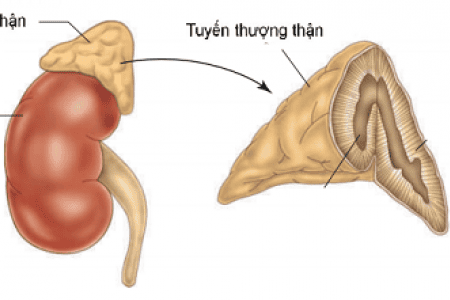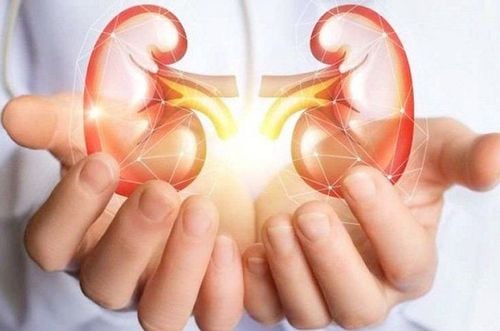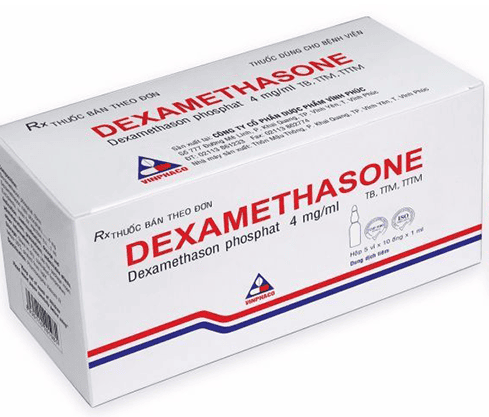This is an automatically translated article.
The adrenal gland is an endocrine organ, involved in the energy metabolism of cells in the body. In addition, the hormones of the gland also partially assist in stabilizing hemodynamics, keeping homeostasis and helping the body to cope with stress. When suffering from chronic adrenal insufficiency, the body cannot avoid certain complications, affecting daily life activities.
Here are the common complications of adrenal insufficiency:
1. Acute adrenal insufficiency
Acute adrenal insufficiency is the most serious complication of chronic adrenal insufficiency. This is an endocrinology emergency.
When the adrenal gland is in acute decline in function, the hormone levels secreted into the circulation are not enough to meet the needs, the symptoms are very prominently observed such as sudden cardiovascular collapse, blood loss. pressure drop rapidly, cold hands and feet, small pulse, rapid, difficult to detect and poor response to fluid replacement and vasopressors. In addition, patients may complain of epigastric pain, sometimes accompanied by nausea, vomiting, dizziness, fatigue, weakness, fatigue, excitement to confusion, drowsiness, lethargy and coma.
Diagnosis is often easy because the patient has a history of long-term adrenal insufficiency or corticosteroid abuse. However, sometimes the diagnosis can be difficult if the clinical and biological symptoms are nonspecific, especially in the setting of unexplained cardiovascular collapse. At this time, if the diagnosis is missed and the treatment is inadequate, the patient's life is very dangerous.

Cơn suy thượng thận cấp là biến chứng nặng nề nhất của tình trạng suy tuyến thượng thận mạn tính
2. Low blood pressure
Low blood pressure is a common symptom, accounting for 90% of cases. To identify low blood pressure, it is necessary to pay attention to compare it with the patient's previous blood pressure.
People with chronic adrenal insufficiency may have persistent low blood pressure or frequent episodes of postural hypotension. Specifically, when changing too quickly from lying to sitting, sitting to standing, the patient will have a sudden feeling of dizziness, lightheadedness, lightheadedness, dizziness, nausea - vomiting. Blood pressure measurement at this time is often found to be 10 to 20 mmHg lower than normal. If you can sit or lie down again, these symptoms will get better, and your blood pressure will also improve.
If the patient has an acute illness such as pneumonia, bronchitis, acute diarrhea or an acute cardiovascular event, these will be the precipitating factors that make the hemodynamic condition worse. Low blood pressure becomes trapped blood pressure, hypotension, weak pulse, difficult to detect, and circulatory shock. These are warning signs for the possibility of acute adrenal insufficiency as mentioned above.
3. Chronic Fatigue
Fatigue is a very common and often earliest symptom. However, the characteristics of fatigue are quite vague, the patient's testimonies are not clear, so it is sometimes easily overlooked.
When there is a lack of cortisol, all energy metabolism inside the cells will be delayed. Therefore, symptoms of fatigue and lethargy appear on many organ systems, both physical, mental and sexual. In particular, the typical feature of impaired vitality due to chronic adrenal insufficiency, which helps distinguish pathologies in other organs, is that fatigue often appears in the morning, right after waking up. This feeling of heaviness increases gradually when it requires strenuous activities such as exercise, walking, climbing stairs, ... tend to be relieved more in the afternoon. This mechanism is commensurate with the adrenal hormone secretion cycle during the day, the highest blood cortisol level is at 8 am, then gradually decreases and the deepest decrease at bedtime during the night.
In some cases, due to a deep drop in cortisol for a long time, the patient even turns to a state of sluggishness, lethargy, apathy and sometimes is unable to walk or do personal daily activities on their own. .

Mệt mỏi là triệu chứng rất thường gặp và thường xuất hiện sớm nhất
4. Skinny
Cortisol is one of the fundamental hormones of life, participating in energy metabolism, regulating water - electrolytes, keeping the homeostasis stable. Therefore, when the adrenal gland is weak, there is not enough cortisol, which causes all internal activities of the body to be delayed. The body becomes thin gradually. The patient loses weight from 2 to 10 kg in a few days to a few weeks due to dehydration due to loss of salt through the urine.
5. Digestive disorders
Complications of weight loss, body weakness due to chronic adrenal insufficiency also due to the function of the digestive system is no longer guaranteed. Patients often have dull, vague abdominal pain, no localization, sometimes easily confused with acute surgical disease.
In addition, side effects when abusing corticosteroids on the stomach - intestines make the patient anorexia, poor appetite, prone to bloating, nausea, vomiting, diarrhea. Consequences of water-electrolyte disturbances on the digestive system are also reduced secretion of gastric juices, digestive enzymes, causing the patient to lose appetite, slow digestion, and distended stomach. All of this makes the patient's overall condition worse.
6. Hyperpigmentation
Characteristics of tanning on these subjects are uneven darkening areas, often found on open skin areas frequently exposed to sunlight, and areas that are rubbed with clothing folds and new scars. . Even private areas are affected such as folds in the hands, feet, knees, toes, elbow joints or even at the nipples, the external genitals are also darkened.
In addition, if examined and observed on the semi-mucosal skin, the mucosa also shows signs of black spots on the cheeks, gums, floor of the mouth, on the inside of the cheeks.
7. Decreased sexual function
Low blood cortisol levels also affect the body's sexual ability. In women, the patient suffers from menstrual disorders, amenorrhea or amenorrhea, anovulatory cycles, frigidity, delayed pregnancy due to accompanying ovarian dysfunction. In men, the patient has decreased libido and erectile dysfunction. In addition, the secondary sexual characteristics in men are also weakened such as thinning hair, little beard, testicular atrophy.
8. Other Complications
Hypoglycemia : Common in children, less common in adults. This complication often occurs when the patient skips or overeats, has a fever, an infection or when vomiting, has a lot of loose stools, especially in acute adrenal insufficiency; Neuropsychiatric disorders: Patient restlessness, apathy or confusion, inability to concentrate thoughts, alternating periods of drowsiness, lethargy and nervous excitability, hyperactivity, struggling; Osteoarthritis: Osteoarthritis is a common cause that causes patients to arbitrarily use products containing corticosteroids. When abused for a long time, if the drug is stopped suddenly, the patient will experience increased joint pain, muscle pain, and general fatigue. The adrenal gland is involved in controlling all vital activities in the body. When the adrenal gland is chronically weakened, there is a shortage of cortisol in the blood, and the function of all organs is delayed. To prevent this problem, it is necessary to avoid the abuse of corticosteroid preparations, only use the drug exactly as indicated, both to protect health and for long-term damage.
Please dial HOTLINE for more information or register for an appointment HERE. Download MyVinmec app to make appointments faster and to manage your bookings easily.
Reference source: Documents of the Medical Examination and Treatment Administration - Ministry of Health












